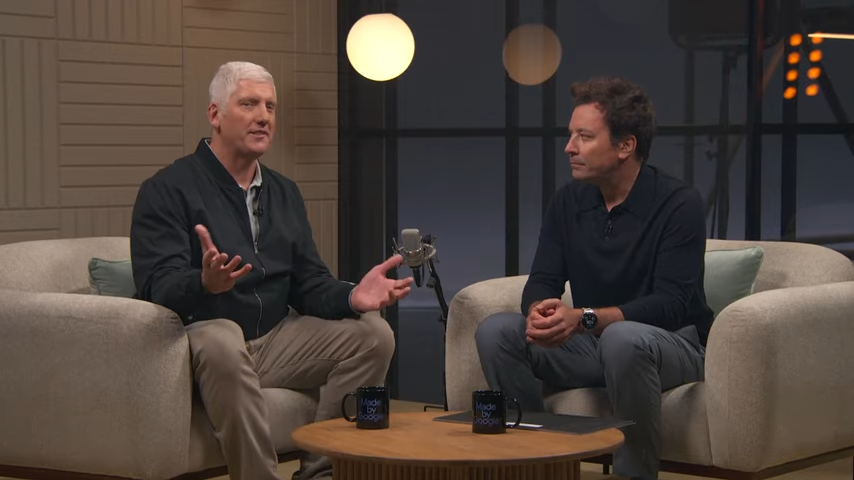Android used to be in a league of its own. Now it feels like it's inauthentically attempting to be part of the "in" crowd.


I don't want to add to the dogpile of critics saying that this week's Made by Google event was "cringe." It wasn't that bad. There were even a few chuckle-worthy moments. For instance, I liked Peloton instructor Cody Rigsby's silly sashay off the stage as Google attempted to introduce the Pixel Watch 4's new personal coaching features. But I don't expect the smartwatch to offer the same level of coaching I've enjoyed with the Peloton for years—did we forget it took a few years before the bikes were compatible with Wear OS smartwatches? Peloton has never seemed like it was meant for the Android user. They use MacBooks in the studio when filming classes!
I see that Google is trying to change the optics of all that. To make Pixel users, at the very least, feel like they're a part of the same mobile microbiome as Apple. As a user, I can appreciate it. I can now connect any Android-compatible smartwatch to the Peloton as a heart rate monitor for exercise. Tech like RCS has helped reduce the feelings of being an outlier among the iPhone-using community; it's nice not to have to beg for someone to send a photo another way so that I can store it in high resolution. With the new PixelSnap ecosystem, I no longer need to buy fake MagSafe cases to access the expansive range of accessories that Apple users have had access to all along.
The bee in my bonnet goes back to the original reason I joined this mobile platform in the first place. In 2010, when I bought the HTC Incredible with my annual subsidy from Verizon, I made it clear to myself that I did not want to be like everyone else. I was okay with not doing some things, while also doing some things better than the iOS ecosystem, because it meant we had something among us "droids" that the Apple sheep could never envision. I have long since expired that metaphor about Apple users because it's petty and ignores that we're all just pawns in a capitalist game. But I can't deny that it was definitely a driving force when I was in my 20s and looking for a mobile operating system to help me stand out as an adult, Making Her Own Decisions™️.
Android used to be about authenticity, to some degree. Yes, it's about openness and customization, though Google has clamped down on both of those about its Pixel ecosystem. The reason everyone is complaining about Jimmy Fallon is that he is the antithesis of that. The guy is awful to his staff. He already did a spot for Apple last year for the iPhone 16 keynote! And while I can appreciate that Steph Curry has been spotted using Pixel devices outside of explicit endorsement, I don't think Alex Cooper, who hosts what I like to refer to as the "Rogan for women" podcast, will ever touch the Pixel device they likely sent home with her. None of this is real!
The reason Apple keynotes work the way that they do is because the company is authentically a consumer device maker. They're always talking to their users. That's been in its DNA since the beginning, which is why its hardware and its keynote hijinks continue to resonate with Apple faithful. Conversely, Google is a search engine. It bought Android in 2005 to divest its business, sure, but at its core, that's always what it will be. Everything you do on the pretty Pixel smartphones is tied to that ethos. That's why Gemini is the main driving force of this generation's Pixel 10 hardware. Gemini is the latest evolution of what all that indexing was about.
Rick Osterloh already told Bloomberg that he's not worried about whether this will convert people into Pixel users or sell more units. Okay, then what was the point of the theatrics? Why not stay true to your roots instead of alienating the audience that made you the most used mobile operating system in the world? I would have preferred a presentation featuring hired actors in skits that showcased what sets Gemini apart. The best part of the Made By Google event this week was when Fallon realized his voice had been expertly imitated and translated into another language. His excitement over it was the only real thing I've seen him do, ever.
If you missed our show this week, we covered the Pixel 10 hardware and what Google released. The After Hours was our live reaction to the keynote and all its inauthenticity.
We also had a super exclusive interview with Google's Mindy Brooks, all about Material 3 Expressive. I hope that the main takeaway you get from our interview with her is that this is not a "Gen Z" interface. This is where user design is at right now in our timeline. It will be the exclusive experience for Pixel users.